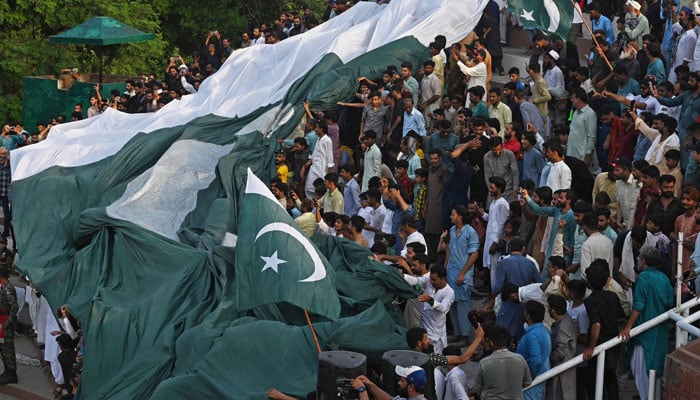Who's in charge here?
Pakistan risks repeating its old mistakes — chasing global applause while losing cohesion at home
October 08, 2025

Pakistan is earning applause abroad but faces anxiety at home. The gap between international recognition and domestic reality has rarely looked so wide — or so dangerous.
The federation is showing deep signs of strain. In Punjab, a new political skirmish has emerged with Sindh and the PPP. What began as a debate over the implementation of BISP for recent flood victims in Punjab has escalated into a war of words. Punjab’s leadership has been increasingly vocal in pointing out what they see as governance failures in Sindh under the PPP. This exchange has gone beyond programmatic disagreements, spilling into sharp rhetoric that sometimes takes racial and ethnic overtones.
Azad Jammu & Kashmir has been convulsing with protests organised by local ‘Public Action Committees’. These citizen-led groups, demanding relief from inflation, higher power tariffs and unemployment, brought thousands into the streets. Clashes between protesters and law enforcement turned deadly. Although the situation was handled through negotiations, it was a major embarrassment, given the recent Pakistan–India conflict. If Pakistan claims a moral responsibility to speak for Kashmiris across the Line of Control, then the spectacle of its own police and paramilitary clashing violently with citizens in AJK makes for an unbearable and deeply uncomfortable situation.
In Khyber Pakhtunkhwa, the shadow of the TTP continues to grow darker. Targeted killings, bombings and attacks on security personnel have returned with worrying frequency. Yet the provincial government seems more invested in its political agenda than in security coordination with the center. The internal squabbles within the PTI also show limitations of its ability to effectively deliver without its founder-chairman.
Balochistan, too, has been jolted by fresh violence. The recent BLA attack in Quetta struck at the symbolic heart of state power — so close to the Frontier Corps Inspector General’s office that it left security officials stunned. When attacks reach this scale, one has to wonder whether the ordinary Baloch citizen — already feeling neglected and alienated — is beginning to sympathise with the insurgents. That possibility is even more alarming than the attack itself.
Meanwhile, the prime minister has been out of the country for more than ten days. Former prime minister Nawaz Sharif has quietly returned to London, leaving behind a political party that looks leaderless at a critical moment. President Asif Ali Zardari was earlier in China for 10 days or so and then in the UAE on a private visit; he has since returned. The absence of the heads of state and government for weeks had raised leadership questions.
Pakistan also faces a deeper absence of political leadership itself. The leader of the party that, by the ECP’s own data, represents perhaps the largest vote bank in the country sits behind bars, and his party has failed to show maturity in difficult moments. The dynastic parties have, meanwhile, left little credible second-tier leadership. In this void, the establishment has steadily overtaken not just governance but also much of the political space itself. The result is an actual crisis of politics.
Every time geopolitics smiles on us, our rulers mistake external applause for internal progress. The current government, like many before it, risks celebrating international recognition while neglecting domestic repair. History offers a lesson. During the Afghan war, Pakistan gained global recognition and resources — but at immense cost to its own society.
The conflict imported radical ideas, entrenched a gun culture and normalised violence. Later, General Musharraf’s pursuit of external approval not only led to heavy-handed tactics at home, such as the Lal Masjid crisis and unrest in (former) Fata, but also grave missteps in Balochistan. The killing of Akbar Bugti, the militarised approach to dissent and the disregard for political reconciliation alienated generations of Baloch. The applause of that era faded, but the consequences remain in the form of resentment, separatism and recurring insurgency.
The federation’s legitimacy is fraying. Ethno-nationalist resentment is rising. Insurgency is knocking at the door. Political parties are seen as distant and transactional, unable to rally the nation.
Yes, the economy is calmer and Pakistan is less isolated internationally. But these are only starting points. The real question is whether this moment will be used to heal divisions, strengthen the federation and restore citizens’ faith in the state.
Unless citizens’ rights and security are placed above political convenience and international spectacle, Pakistan risks repeating its old mistakes — chasing global applause while losing cohesion at home. And the question that hangs heavy, then as now, will remain: who is really in charge?
The writer is executive director of Gallup Pakistan and holds a Masters degree from the School of Oriental and African Studies (SOAS), London.
Disclaimer: The viewpoints expressed in this piece are the writer's own and don't necessarily reflect Geo.tv's editorial policy.
Originally published in The News











